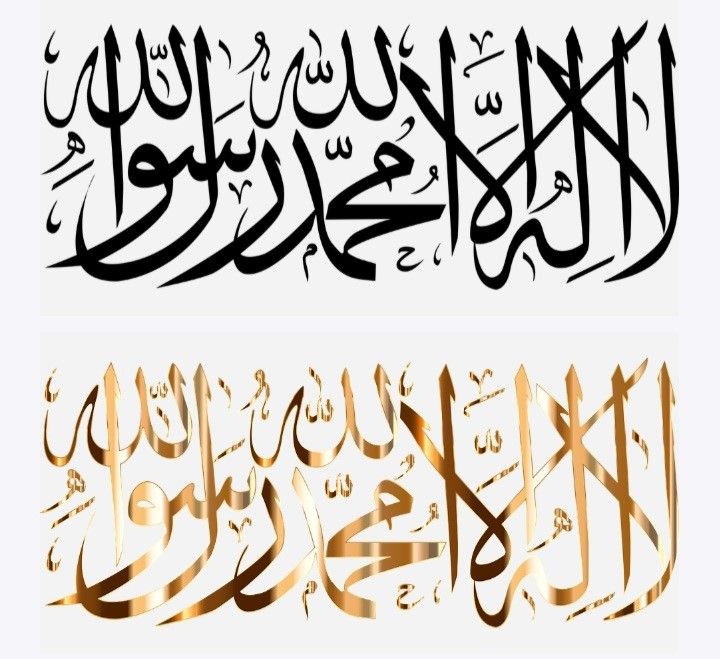In The Name of Allaah, The Most Merciful, The Bestower of Mercy.
The creeds are two types – the creed revealed by Allaah and the creed initiated by the people. However, the sound and correct creed can only be from Allaah’s Wahi [the revelation sent down by Allaah in the Qur’aan and the authentic Sunnah]. Allaah [The Most High] informed us about Yusuf [peace be upon him] that he said to his companions in the prison:
يَا صَاحِبَيِ السِّجْنِ أَأَرْبَابٌ مُتَفَرِّقُونَ خَيْرٌ أَمِ اللَّهُ الْوَاحِدُ الْقَهَّارُ; مَا تَعْبُدُونَ مِنْ دُونِهِ إِلَّا أَسْمَاءً سَمَّيْتُمُوهَا أَنْتُمْ وَآَبَاؤُكُمْ مَا أَنْزَلَ اللَّهُ بِهَا مِنْ سُلْطَانٍ إِنِ الْحُكْمُ إِلَّا لِلَّهِ أَمَرَ أَلَّا تَعْبُدُوا إِلَّا إِيَّاهُ ذَلِكَ الدِّينُ الْقَيِّمُ وَلَكِنَّ أَكْثَرَ النَّاسِ لَا يَعْلَمُونَ
O two companions of the prison! Are many different lords (gods) better or Allah, the One, the Irresistible? You do not worship besides Him but only names which you have named (forged), you and your fathers, for which Allah has sent down no authority. The command (or the judgement) is for none but Allah. He has commanded that you worship none but Him (i.e. His Monotheism), that is the (true) straight religion, but most men know not. [Surah Yusuf Aayaat 39-40]
Allaah (The Most High) said:
أَفَرَأَيْتُمُ اللَّاتَ وَالْعُزَّى
وَمَنَاةَ الثَّالِثَةَ الْأُخْرَى
أَلَكُمُ الذَّكَرُ وَلَهُ الْأُنْثَى
تِلْكَ إِذًا قِسْمَةٌ ضِيزَى
إِنْ هِيَ إِلَّا أَسْمَاءٌ سَمَّيْتُمُوهَا أَنْتُمْ وَآَبَاؤُكُمْ مَا أَنْزَلَ اللَّهُ بِهَا مِنْ سُلْطَانٍ إِنْ يَتَّبِعُونَ إِلَّا الظَّنَّ وَمَا تَهْوَى الْأَنْفُسُ وَلَقَدْ جَاءَهُمْ مِنْ رَبِّهِمُ الْهُدَى
Have you then considered Al-Lat, and Al-‘Uzza (two idols of the pagan Arabs) And Manat (another idol of the pagan Arabs), the other third? Is it for you the males and for Him the females? That indeed is a division most unfair! They are but names which you have named, you and your fathers, for which Allah has sent down no authority. [Soorah Najm:19-23]
Allaah (The Most High) said:
أَمْ لَهُمْ شُرَكَاءُ شَرَعُوا لَهُمْ مِنَ الدِّينِ مَا لَمْ يَأْذَنْ بِهِ اللَّهُ
Or have they partners with Allah (false gods), who have instituted for them a religion which Allah has not allowed. [Surah Ash-Shoorah: Ayah:21]
Allaah (The Most High) said:
وَكَذَلِكَ أَوْحَيْنَا إِلَيْكَ رُوحًا مِنْ أَمْرِنَا مَا كُنْتَ تَدْرِي مَا الْكِتَابُ وَلَا الْإِيمَانُ وَلَكِنْ جَعَلْنَاهُ نُورًا نَهْدِي بِهِ مَنْ نَشَاءُ مِنْ عِبَادِنَا وَإِنَّكَ لَتَهْدِي إِلَى صِرَاطٍ مُسْتَقِيمٍ
صِرَاطِ اللَّهِ الَّذِي لَهُ مَا فِي السَّمَاوَاتِ وَمَا فِي الْأَرْضِ أَلَا إِلَى اللَّهِ تَصِيرُ الْأُمُورُ
And thus We have sent to you (O Muhammad) Ruhan (an Inspiration, and a Mercy) of Our Command. You knew not what is the Book, nor what is Faith? But We have made it (this Qur’an) a light wherewith We guide whosoever of Our slaves We will. And verily, you (O Muhammad) are indeed guiding (mankind) to the Straight Path (i.e. Allah’s religion of Islamic Monotheism). [Surah Ash-Shoorah: Aayaat 52-53]
All these verses of the Qur’aan demonstrate the fact that the sound Islamic creed can only be derived from the revelation [i.e. the Qur’aan and the authentic Sunnah].
The delegation of Abdul Qais: The delegation said, “O Messenger of Allaah, we come to you from a far-off distance and there lives between you and us a tribe- the unbelievers of Mudar, and it is not possible for us to come to you except in the sacred months; so direct us to a clear command regarding which we are to inform others and by way of which we may enter paradise. The Prophet [sallal-laahu-alayhi-wasallam] said, ‘I command you to do four things and forbid you from four things’, and he added, ‘I command you to have Eemaan in Allaah’, and then he [sallal-laahu-alayhi-wasallam] asked them, ‘Do you know what Imaan in Allaah is?’ They said, ‘Allaah and His Messenger know best’’. He said, ‘It is the testimony that none has the right to be worshipped except Allaah and that Muhammad is the messenger of Allaah….’” [Saheeh Muslim]
These people were Arabs and people of eloquence in their language, however when the Messenger asked them about Eemaan they replied, “Allaah and His Messenger know best”. This shows that the affairs of the creed and Eemaan are only established by way of the revelation. As for the people of bidah and evil desires, some of them derive their creed by way of the intellect, opinions, dreams, fables and beliefs they desire.
Principles We Must Establish In This Affair
The First Principle: The Messenger [sallal-laahu-alayhi-wasallam] has clarified all the affairs of the religion. He has clarified its fundamentals, subsidiary issues, beliefs and prescribed laws. Allaah [The Most High] said:[الْيَوْمَ أَكْمَلْتُ لَكُمْ دِينَكُمْ وَأَتْمَمْتُ عَلَيْكُمْ نِعْمَتِي وَرَضِيتُ لَكُمُ الْإِسْلَامَ دِينًا – This day, I have perfected your religion for you, completed My Favour upon you, and have chosen for you Islam as your religion]. [Surah Al-Maa-idah: Ayah 3]
Therefore, when it is the case that the Messenger [sallal-laahu-alayhi-wasallam] even explained- in detail- the etiquettes of using the toilet, then it is not possible that he would not have detailed the affairs of the creed, thus giving an allowance for others to come along and make up beliefs based on their intellects, opinions etc. Indeed, the Messenger [sallal-laahu-alayhi-wasallam] has clarified all the Religion, its creed and laws.
The Second Principle: The Qur’aan and the [authentic] Sunnah of the Messenger [sallal-laahu-alayhi-wasallam] are the sources of the religion, and every dispute between the Muslims is to be referred back to them. Allaah [The Most High] said: [فَلَا وَرَبِّكَ لَا يُؤْمِنُونَ حَتَّى يُحَكِّمُوكَ فِيمَا شَجَرَ بَيْنَهُمْ ثُمَّ لَا يَجِدُوا فِي أَنْفُسِهِمْ حَرَجًا مِمَّا قَضَيْتَ وَيُسَلِّمُوا تَسْلِيمًا – But no, by your Lord, they can have no Faith, until they make you (O Muhammad ) judge in all disputes between them, and find in themselves no resistance against your decisions, and accept (them) with full submission] [Soorah An-Nisaa: ayah:65]
Allaah (The Most High) said:
وَمَا كَانَ لِمُؤْمِنٍ وَلَا مُؤْمِنَةٍ إِذَا قَضَى اللَّهُ وَرَسُولُهُ أَمْرًا أَنْ يَكُونَ لَهُمُ الْخِيَرَةُ مِنْ أَمْرِهِمْ وَمَنْ يَعْصِ اللَّهَ وَرَسُولَهُ فَقَدْ ضَلَّ ضَلَالًا مُبِينًا
It is not for a believer, man or woman, when Allah and His Messenger have decreed a matter that they should have any option in their decision. And whoever disobeys Allah and His Messenger, he has indeed strayed in a plain error. [Surah Al-Ahzaab: Ayah:36]
Allaah (The Most High) said:
يَا أَيُّهَا الَّذِينَ آَمَنُوا أَطِيعُوا اللَّهَ وَأَطِيعُوا الرَّسُولَ وَأُولِي الْأَمْرِ مِنْكُمْ فَإِنْ تَنَازَعْتُمْ فِي شَيْءٍ فَرُدُّوهُ إِلَى اللَّهِ وَالرَّسُولِ إِنْ كُنْتُمْ تُؤْمِنُونَ بِاللَّهِ وَالْيَوْمِ الْآَخِرِ ذَلِكَ خَيْرٌ وَأَحْسَنُ تَأْوِيلًا
O you who believe! Obey Allah and obey the Messenger (Muhammad), and those of you (Muslims) who are in authority. (And) if you differ in anything amongst yourselves, refer it to Allah and His Messenger (), if you believe in Allah and in the Last Day. That is better and more suitable for final determination.’’ [Surah An-Nisaa: Ayah: 59]
And referring back to Allaah is to refer to His Book [i.e. the Qur’aan] and referring to the Messenger [sallal-laahu-alayhi-asallam] is to refer to his [authentic] Sunnah. The one who does not do this; then indeed he has deviated from the straight path. Shaikhul Islaam Ibn Taymiyyah [rahimahullaah] used to say often:
مَنْ فَارَقَ الدَّلِيل ضَلَّ السَّبِيل وَلَا دَلِيل إِلَّا بِمَا جَاءَ بِهِ الرَّسُول
Whoever opposes the proofs will be led away from the path, and there is no proof, except that which the Messenger came with.
Ibn Abil Izz Al-Hanafi [rahimahullaah] said:
كَيْفَ يُرَام الْوُصُول إِلَى عِلْمِ الْأُصُولِ بِغيْرِ مَا جَاءَ بِهِ الرَّسُول
How can one aim at reaching knowledge of the fundamental principles of the (religion) with other than what the Messenger brought?!
The Third Principle: A Muslim is not to put himself forward before Allaah and His Messenger. He is not to speak about the Religion without knowledge from Allaah and His Messenger, because that is one of the greatest sins and crimes. Allaah [The Most High] said: [يَا أَيُّهَا الَّذِينَ آَمَنُوا لَا تُقَدِّمُوا بَيْنَ يَدَيِ اللَّهِ وَرَسُولِهِ وَاتَّقُوا اللَّهَ إِنَّ اللَّهَ سَمِيعٌ عَلِيمٌ – O you who believe! Do not put (yourselves) forward before Allah and His Messenger, and fear Allah. Verily! Allah is All-Hearing, All-Knowing]. [Surah Al-Hujuraat: Ayah:1]
This means: Neither speak [about the religion] until Allaah and His Messenger have spoken, nor act in the name of the religion until you are commanded- whether in affairs related to creed, acts of worship or affairs related to knowledge of the religion.
Allaah (The Most High) said:
وَلَا تَقْفُ مَا لَيْسَ لَكَ بِهِ عِلْمٌ إِنَّ السَّمْعَ وَالْبَصَرَ وَالْفُؤَادَ كُلُّ أُولَئِكَ كَانَ عَنْهُ مَسْئُولًا
And follow not (O man i.e., say not, or do not or witness not, etc.) that of which you have no knowledge (e.g. one’s saying: “I have seen,” while in fact he has not seen, or “I have heard,” while he has not heard). Verily! The hearing, and the sight, and the heart, of each of those you will be questioned (by Allah). [Soorah Al-Israa: Ayah:36]
The Fourth Principle: Our understanding of the Qur’aan and the [authentic] Sunnah of the Messenger [sallal-laahu-alayhi-wasallam] has to be agree in agreement with the understanding of the Salaf [i.e. the pious predecessors]. They possessed the most pious of hearts and purest souls; they were the ones who received the religion directly from the Messenger [sallal-laahu-alayhi-wasallam], transmitted it to the Ummah as they heard it and fulfilled its requirements. Indeed, Allaah selected them to be the companions of the Messenger [sallal-laahu-alayhi-wasallam] and carriers of His religion, Allaah was pleased with them and they were pleased with Allaah, Allaah sent down tranquility upon them and granted them piety. Therefore, it is obligated on us to understand the religion in the manner in which they understood it, and t not permissible for anyone to come along and say, “They [i.e. the companions of Muhammad] were men and we are men [i.e. intending to abandon their way]”. If someone says this, then indeed he is a person of misguidance, and because of this reason, Allaah [The Most High] said: [وَمَنْ يُشَاقِقِ الرَّسُولَ مِنْ بَعْدِ مَا تَبَيَّنَ لَهُ الْهُدَى وَيَتَّبِعْ غَيْرَ سَبِيلِ الْمُؤْمِنِينَ نُوَلِّهِ مَا تَوَلَّى وَنُصْلِهِ جَهَنَّمَ وَسَاءَتْ مَصِيرًا – And whoever contradicts and opposes the Messenger (Muhammad ) after the right path has been shown clearly to him and follows other than the believers’ way. We shall keep him in the path he has chosen and burn him in Hell – what an evil destination]. [Surah An-Nisaa: Ayah:115]
And Allaah [The Most High] said:
وَالسَّابِقُونَ الْأَوَّلُونَ مِنَ الْمُهَاجِرِينَ وَالْأَنْصَارِ وَالَّذِينَ اتَّبَعُوهُمْ بِإِحْسَانٍ رَضِيَ اللَّهُ عَنْهُمْ وَرَضُوا عَنْهُ وَأَعَدَّ لَهُمْ جَنَّاتٍ تَجْرِي تَحْتَهَا الْأَنْهَارُ خَالِدِينَ فِيهَا أَبَدًا ذَلِكَ الْفَوْزُ الْعَظِيمُ
And the first to embrace Islam of the Muhajirun (those who migrated from Makkah to Al-Madinah) and the Ansar (the citizens of Al-Madinah who helped and gave aid to the Muhajirun) and also those who followed them exactly (in Faith). Allah is well-pleased with them as they are well-pleased with Him. He has prepared for them Gardens under which rivers flow (Paradise), to dwell therein forever. That is the supreme success. [Soorah At-Tawbah: Ayah: 100]
This is the aim: We follow them exactly (in faith) and we follow their path. The closer a person is in following them, then the closer is he to guidance. In an authentic hadeeth, the Messenger [sallal-laahu-alayhi-wasallam] said: ”The best of people are those living in my generation, then those who come after them, and those after them….’’
The Fifth Principle: It is obligated on a person who has been granted this favour [i.e. adherence to the Qur’aan, the authentic Sunnah and the path of the companions] that he remains steadfast upon it- steadfast upon it by way of knowledge, creed and action until Allaah takes his soul. Allaah said: [ فَٱسۡتَقِمۡ كَمَآ أُمِرۡتَ – So stand (ask Allah to make) you (Muhammad) firm and straight (on the religion of Islamic Monotheism) as you are commanded]. [Surah Hud. Ayah 112]
Steadfastness can only fulfilled through that which Allaah has revealed. Allaah [The Most High] said:[إِنَّ الَّذِينَ قَالُوا رَبُّنَا اللَّهُ ثُمَّ اسْتَقَامُوا فَلَا خَوْفٌ عَلَيْهِمْ وَلَا هُمْ يَحْزَنُونَ – Verily, those who say: “Our Lord is (only) Allah,” and thereafter Istaqamu (i.e. stood firm and straight on the Islamic Faith of Monotheism by abstaining from all kinds of sins and evil deeds which Allah has forbidden and by performing all kinds of good deeds which He has ordained), on them shall be no fear, nor shall they grieve]. [Soorah Al-ahqaah: Ayah:13]
Allaah [The Most High] said: [إِنَّ الَّذِينَ قَالُوا رَبُّنَا اللَّهُ ثُمَّ اسْتَقَامُوا تَتَنَزَّلُ عَلَيْهِمُ الْمَلَائِكَةُ أَلَّا تَخَافُوا وَلَا تَحْزَنُوا وَأَبْشِرُوا بِالْجَنَّةِ الَّتِي كُنْتُمْ تُوعَدُونَ – Verily, those who say: “Our Lord is Allah (Alone),” and then they Istaqamu , on them the angels will descend (at the time of their death) (saying): “Fear not, nor grieve! But receive the glad tidings of Paradise which you have been promised!].[Soorah Fussilat: Ayah:30]
This steadfastness is sought from a slave of Allaah- steadfastness upon the [sound] creed, righteous action and deeds that draws him close to Allaah until Allaah takes away his soul. Allaah (The Most High) said: [وَاعْبُدْ رَبَّكَ حَتَّى يَأْتِيَكَ الْيَقِينُ – And worship your Lord until there comes unto you the certainty (i.e. death)]. [Soorah al-Hijr: Ayah:99]
And Allaah [The Most High] said: [يَا أَيُّهَا الَّذِينَ آَمَنُوا اتَّقُوا اللَّهَ حَقَّ تُقَاتِهِ وَلَا تَمُوتُنَّ إِلَّا وَأَنْتُمْ مُسْلِمُونَ – O you who believe! Fear Allah (by doing all that He has ordered and by abstaining from all that He has forbidden) as He should be feared. [Obey Him, be thankful to Him, and remember Him always], and die not except in a state of Islam (as Muslims) with complete submission to Allah]. [Soorah Aala Imraan: Ayah: 102]
And one of the tremendous supplications is that which has been reported by Ibn Abee Shaybah that Abu Dardaa [radiyallaahu-anhu] used to supplicate:
اللَّهُمَّ إِنِّي أَسْأَلُكَ إيمَانًا دَائِمًا وَعِلْمًا نَافِعًا وَهَدْيًا قَيِّمًا
O Allaah! I ask you for abiding Eemaan, beneficial knowledge and upright guidance.
Mu’aawiyyah Ibn Qurra [rahimahullaah] transmitted this narration from Abu Dardaa [radiyallaahu-anhu] and then said: ”Because there is Eemaan that is not abiding, knowledge that is not beneficial and guidance that is not upright.” Therefore, a Muslim must ask Allaah for these (things) and he should employ the means to attaining them, as the Messenger [sallal-laahu-alayhi-wasallam] said: “Be eager for what is of benefit to you and place your reliance upon Allaah”.
The Sixth Principle: And after being steadfastness upon the [sound creed, the Qur’aan, the Sunnah and the way of the pious predecessors], one must call to it. Allaah [The Most High] said:
وَالْعَصْرِ
إِنَّ الْإِنْسَانَ لَفِي خُسْرٍ
إِلَّا الَّذِينَ آَمَنُوا وَعَمِلُوا الصَّالِحَاتِ وَتَوَاصَوْا بِالْحَقِّ وَتَوَاصَوْا بِالصَّبْرِ
By Al-‘Asr (the time). Verily! Man is in loss, Except those who believe (in Islamic Monotheism) and do righteous good deeds, and recommend one another to the truth (i.e. order one another to perform all kinds of good deeds (Al-Ma’ruf) which Allah has ordained, and abstain from all kinds of sins and evil deeds (Al-Munkar) which Allah has forbidden), and recommend one another to patience (for the sufferings, harms, and injuries which one may encounter in Allah’s Cause during preaching His religion of Islamic Monotheism or Jihad, etc.). [Soorah al-Asr]
One has to propagate the sound path and the religion based on what Allaah makes easy for him to propagate. The Messenger [sallal-laahu-alahi-wasallam] said to Ali [radiyallaahu-anhu], “By Allaah, for Allah to guide one man by you is better for you than red camels.” The Messenger also said: “Whoever calls to guidance, he will be rewarded, and (also) receive reward equal to those who follow him, without their rewards being reduced in the least.” The Messenger also said: ”The one who guides to good is like the doer of that deed itself”.
To be continued….InShaaAllaah
[Source: Madkhal Li-Diraasati Aqeedah Al-Islaamiyyah. Lesson 2- By Shaikh Abdur Razzaaq Al-Badr (may Allaah preserve him)]





